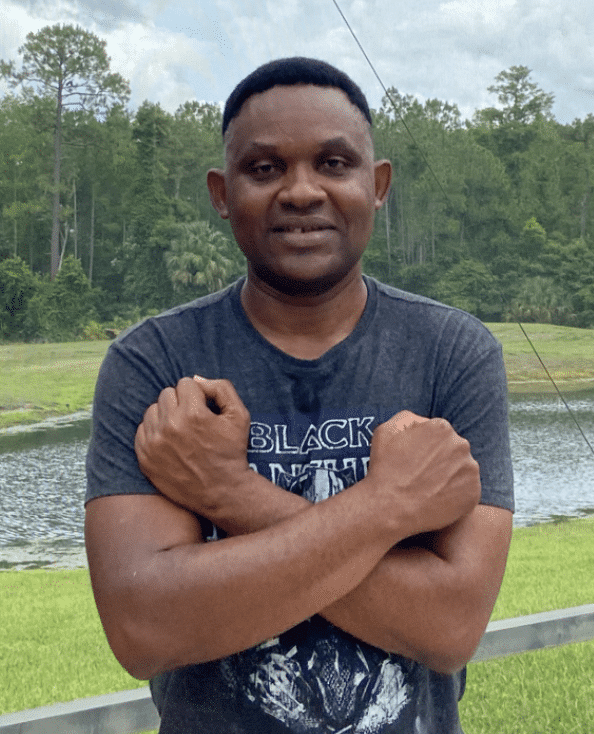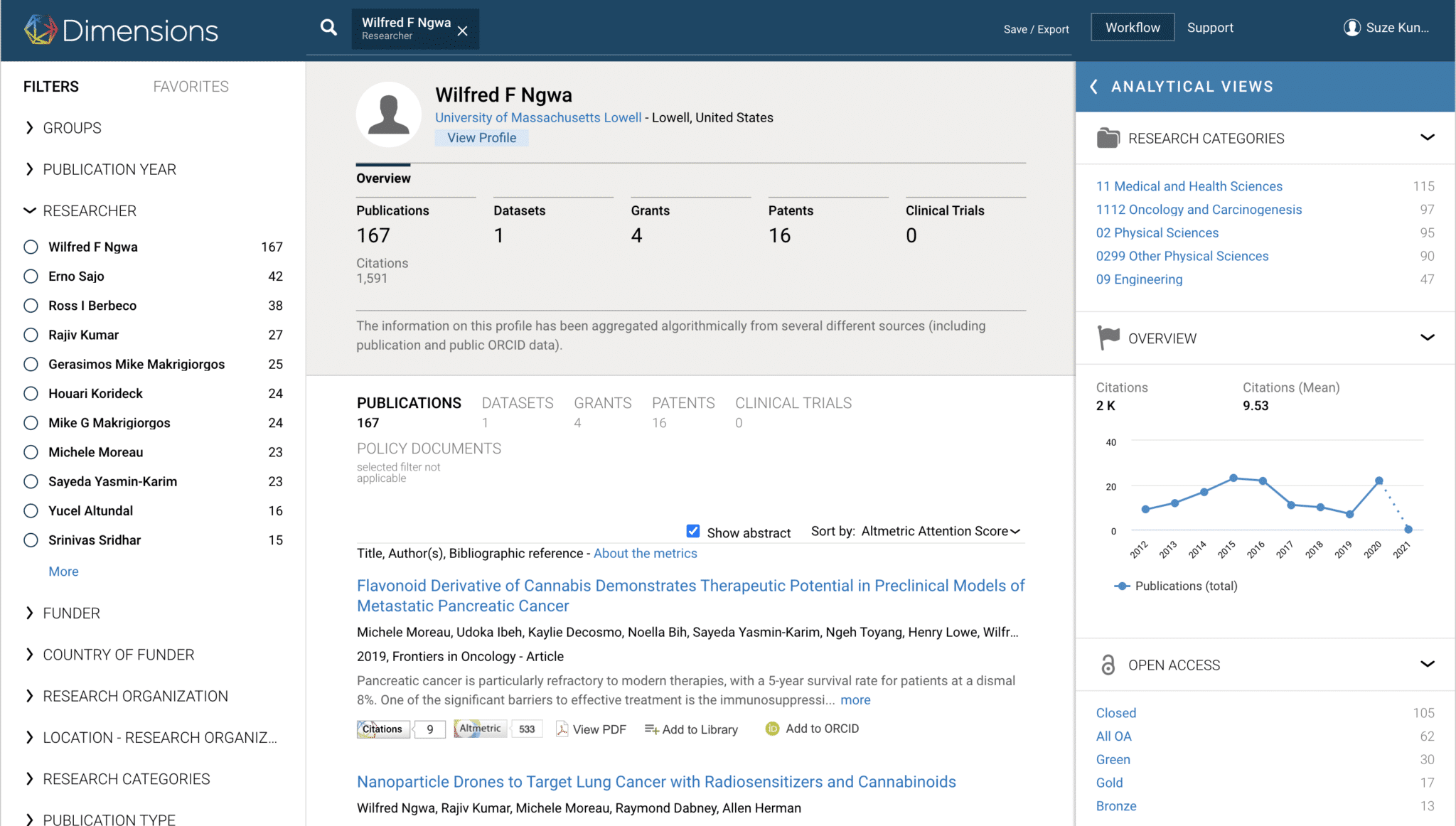Black History Month is a time to remember and celebrate Black figures in history. It takes place in the USA in February, and in the UK in October. This year, Digital Science’s Suze Kundu and ReadCube’s Olivia Bates wanted to celebrate the science, technology, engineering and mathematics (STEM) heroes from the USA and the UK that are making history. For Black History Month USA, they asked our STEM heroes what changes they would like to see in research culture in 2021, with a view to revisiting them in October, Black History Month UK, to celebrate the progress that has been made, and highlight the work that still needs to be done for greater equality, diversity and inclusion of Black people and other underrepresented groups in STEM.
The series kicks off with some thoughts from scientist Wilfred Ngwa, MS, PhD. Dr Ngwa is an African American professor in Radiation Oncology with faculty appointments at Harvard Medical School, University of Massachusetts where he is Adjunct Full Professor, and ICT University where he holds the post of Distinguished Visiting Full Professor. He recently held guest professorships at the University of Pennsylvania USA and the University of Heidelberg in Germany, and an Associate Professorship at the University of Massachusetts.
Research Background

Dr Ngwa is the founding Director of the Global Health Catalyst dedicated to catalyzing high-impact international collaborations to reduce global health disparities in research, education, and oncology. Some major outcomes of this include the award-winning Global Oncology University and the International Phytomedicines Institute he has co-founded.
Dr Ngwa has published 5 books, and over 100 research articles including in leading journals like Science, Nature, Lancet, and PNAS. He currently serves as a chair of the Lancet Oncology Commission for Sub-Saharan Africa and is widely recognized for his strong commitment as a leader to enhance diversity and inclusion, and catalyzing high impact collaborations between USA, European and Low and Middle Income Country (LMICs) Institutions to eliminate disparities.
Dr Ngwa has been awarded 8 honours over the past 6 years alone at Harvard, including 2 “Best in Physics” awards by the American Association of Physicists in Medicine, two research excellence awards from the United States National Institutes of Health, and the 2019 Brigham and Women’s Hospital Physician Organization award.
One of Dr Ngwa’s notable inventions is on Nanoparticle Drones for Targeting Cancer during radiotherapy, for which he won the 2015 Bright Futures Prize. His article “Flavonoid Derivative of Cannabis Demonstrates Therapeutic Potential in Preclinical Models of Metastatic Pancreatic Cancer” has gained more views than 99% of all Frontiers articles over the past year. His recent article on “The role of Black people in ending systemic racism in oncology” was the Lancet Oncology Editor’s Pick for February 2021.
A quick Dimensions search reveals the breadth and depth of Dr Ngwa’s work, including his paper, Flavonoid Derivative of Cannabis Demonstrates Therapeutic Potential in Preclinical Models of Metastatic Pancreatic Cancer, which has received his highest Altmetric attention score
What changes would you like to see in research culture in 2021?
I would like to see a greater culture of collaboration both within the Black researcher community and between Black researchers and researchers of other racial groups. For this to happen, research institutions and related organizations need to do three things: Reparations, Recruitment and Recognition.
Reparations in research mean that institutions must purposefully make substantial financial investments in addressing systemic racism or inequalities in STEM and related fields. These inequalities are evidenced in the disproportionately small percentage of Black people in STEM1 and the lack of recognition for that small percentage of Black people. I would like to see such reparation investments go towards greater recruitment and recognition, as these game-changing commitments by institutions advance a greater culture of diversity and inclusion.
In recruitment, organizations should invest in making sure that the percentage of Black people in the population ( e.g. 13.4 % in the USA) is also reflected in the institution at all levels, from trainees through faculty to leadership positions. With respect to recognition, a recent analysis of data2 from nearly all US PhD dissertations across three decades shows that demographically underrepresented students are more likely to develop novel contributions to science than majority students such as White students, but their novel contributions are less likely to earn them academic recognition or promotion.
This paradox might partly explain the underrepresentation of Black scientists in influential positions in academia. This culture can be changed by purposefully investing in creating opportunities that recognize minority populations. Increased recognition can, in turn, inspire greater participation of Black people in STEM, thus creating new role models and a positive cycle of growth. So, altogether, I would like to see more collaborations, which can result from a significant investment directed towards recruiting Black people to influential positions at institutions and empowering them with the resources to lead more recruitment and recognition at all levels of the organization collaborating with other colleagues.
Learning From History
As we celebrate Black History Month, history teaches us that an analogous approach promoting a culture of collaboration across racial groups was crucial in ending slavery. During the American Civil War, a large contingent of Black people was recruited and fought gallantly alongside White people to end slavery. However, the recruitment of Black people was slow until Black leaders, such as Frederick Douglass, connected with, encouraged and inspired Black men to become soldiers. The government invested in establishing a Bureau of Colored Troops in May 1863 that helped manage the recruitment and burgeoning numbers of Black soldiers.
Nowadays, investments in purposefully recruiting influential Black leaders like Douglas in each organization to lead recruitment and recognition of Black researchers at all levels can also help and is a sine qua non for ending systemic racial inequalities in STEM and other fields3. In some ways, the new administration of President Joe Biden and Vice President Kamala Harris seems to be setting a good example. Biden has been very purposeful in recruiting leaders in his administration that reflect the USA population, and his government has committed to making significant investments to achieve racial equality as a top priority for the USA in years to come.
1: The Lancet. Medicine and medical science: Black lives must matter more. Lancet. 2020. DOI:10.1016/S0140-6736(20)31353-2
2: Hofstra B, Kulkarni V V., Galvez SMN, He B, Jurafsky D, McFarland DA. The diversity–innovation paradox in science. Proc Natl Acad Sci U S A 2020. DOI:10.1073/pnas.1915378117
3: Ngwa W. The role of Black people in ending systemic racism in oncology. Lancet Oncol 2021; 22: 172




